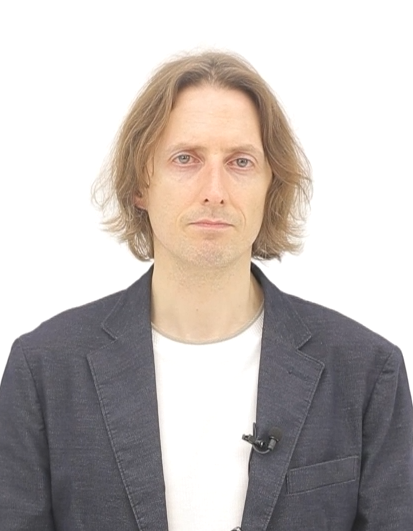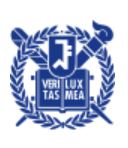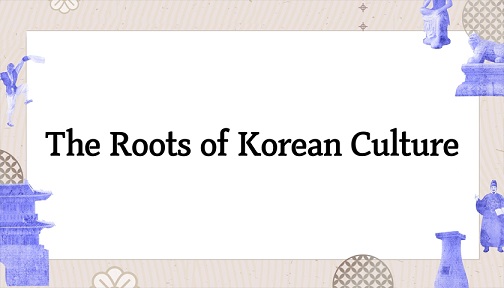강좌 소개
홍보/예시 영상
강좌 운영 계획
|
주차 |
주차명 (주제) |
차시 |
차시명 |
형성평가 |
|
1 |
Korean History - From Prehistoric Times to the Colonial Period, in Brief |
1-1 |
Overview |
|
|
1-2 |
From Stone to Iron: The Early Kingdoms |
|
||
|
1-3 |
The Three Kingdoms Period: Goguryeo, Baekje, Silla |
|
||
|
1-4 |
The North and South Kingdoms: Silla and Balhae |
|
||
|
1-5 |
Unification of the Peninsula: Goryeo |
|
||
|
1-6 |
The 500-Year Dynasty: Joseon |
|
||
|
1-7 |
Korea, Interrupted: Early Modern Korean and the Colonial Period |
Quiz, Discussion, Assignment |
||
|
2 |
Korean Language - Korean as it is Spoken, Written, and Lived |
2-1 |
Overview |
|
|
2-2 |
The History and Characteristics of the Korean Language |
|
||
|
2-3 |
Writing Systems: Hanmun and Hangeul |
|
||
|
2-4 |
A Brief Study of Hangeul and Korean Phonology |
|
||
|
2-5 |
Social and Cultural Aspects of the Korean Language |
|
||
|
2-6 |
Closing |
Quiz, Discussion, Assignment |
||
|
3 |
Korean Religion - From Native Beliefs to Foreign Creeds |
3-1 |
Overview |
|
|
3-2 |
Korean Shamanism |
|
||
|
3-3 |
Korean Buddhism |
|
||
|
3-4 |
Korean Christianity |
|
||
|
3-5 |
Eastern Learning |
|
||
|
3-6 |
Closing |
Quiz, Discussion, Assignment |
||
|
4 |
Korean Philosophy - The Development and Importance of Confucianism |
4-1 |
Overview |
|
|
4-2 |
Origins and Key Concepts of Confucianism |
|
||
|
4-3 |
History and Development of Confucianism in Korea |
|
||
|
4-4 |
Philosophy of Neo-Confucianism |
|
||
|
4-5 |
Confucianism in Korea’s Ideological Tapestry |
|
||
|
4-6 |
Closing: Confucianism Today |
Quiz, Discussion, Assignment |
||
|
5 |
Korean Architecture - Harmony in Form and Function |
5-1 |
Overview |
|
|
5-2 |
Basic Characteristics of Korean Architecture |
|
||
|
5-3 |
Residential Architecture: Home, Hearth, and Hanok |
|
||
|
5-4 |
State Architecture: Palaces and Fortress Walls |
|
||
|
5-5 |
Sacred Architecture: Temples and Pagodas |
|
||
|
5-6 |
Closing |
Quiz, Discussion, Assignment |
||
|
6 |
Korean Traditional Fine Arts - Visual Expression of the Creative Spirit |
6-1 |
Introduction |
|
|
6-2 |
From Prehistoric Times to Old Joseon |
|
||
|
6-3 |
The Three Kingdoms |
|
||
|
6-4 |
The North and South Kingdoms |
|
||
|
6-5 |
Goryeo |
|
||
|
6-6 |
Joseon |
Quiz, Discussion, Assignment |
||
|
7 |
Korean Traditional Music - Melodies from the Past Still Played Today |
7-1 |
Introduction |
|
|
7-2 |
Brief History of Korean Music |
|
||
|
7-3 |
Introduction to Popular Traditional Instruments |
|
||
|
7-4 |
Ritual and Court Music |
|
||
|
7-5 |
Vocal Music |
|
||
|
7-6 |
Instrumental Music |
|
||
|
7-7 |
Closing |
Quiz, Discussion, Assignment |
||
|
8 |
Korean Traditional Performing Arts – Bringing Excitement to the Stage |
8-1 |
Introduction to Traditional Performing Arts |
|
|
8-2 |
Pansori |
|
||
|
8-3 |
Mask Dances |
|
||
|
8-4 |
Changgeuk |
|
||
|
8-5 |
Madanggeuk |
|
||
|
8-6 |
Closing |
Quiz, Discussion, Assignment |
||
|
9 |
Korean Folklore and Mythology - A Wellspring of Culture |
9-1 |
Introduction to Korean Folklore and Mythology |
|
|
9-2 |
Myth, Legend, and Folktales: Defining Genres |
|
||
|
9-3 |
Mythology: Foundation Myth and Shaman Songs |
|
||
|
9-4 |
Legends: Deeds Great and Tragic |
|
||
|
9-5 |
Folktales: Talking Animals and Other Colorful Characters |
|
||
|
9-6 |
Closing: The Importance of Korean Folklore |
Quiz, Discussion, Assignment |
||
|
10 |
Korean Classical Literature - A Long Tradition of Letters |
10-1 |
Overview of Korean Classical Literature |
|
|
10-2 |
Theoretical Introduction to Korean Literature |
|
||
|
10-3 |
Classical Poetry |
|
||
|
10-4 |
Classical Fiction |
|
||
|
10-6 |
Closing |
Quiz, Discussion, Assignment |
강좌운영팀 소개
교수자

- 나수호(Charles La Shure) 교수
- 서울대학교 국어국문학과 교수
강좌지원팀

- 황정수
- 서울대학교 국어국문학과 박사과정
- e-mail: hjs03110@snu.ac.kr
강좌 수강 정보
이수/평가정보
| 과제명 | 퀴즈 | 토론 | 과제 | |
|---|---|---|---|---|
| 반영비율 | 0% | 0% | 100% |
※ 총 60% 이상 점수 획득 시, 이수증을 발급받을 수 있습니다.
강좌 수준 및 선수요건
강좌수준: 교양
선수요건: 없음
교재 및 참고문헌
'교재' 탭의 PDF 파일을 참조하기 바랍니다.
자주 묻는 질문
강좌 교재가 따로 있나요?
'교재' 탭의 PDF 파일을 참조하기 바랍니다.
평가는 어떻게 이루어지나요?
퀴즈, 토론, 과제로 이루어지며 과제 점수의 총합이 60점 이상이면 이수증이 발급됩니다.








